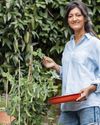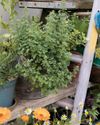
Once the tomatoes, peppers and cucumbers are cleared away at the end of summer, does your greenhouse sit devoid of plants through winter? I urge you, have a rethink!
Your greenhouse is a magnificent vessel for growing crops during the cooler months of the year and no costly heat is needed. From the tiniest microgreens to salad leaves, robust leafy veg and beyond, think of your greenhouse as a huge cloche that will encourage lush, palatable foliage. It's an excellent space for the more tender edibles, too, like lemongrass and ginger, offering them a protected environment so they can safely grow through the winter period once conditions outside become too harsh.
This month is a key time in the greenhouse grow-your-own calendar - so it's time to get sowing. In this feature, I'll explain what hardy crops can be sown in September, ready to jump into your greenhouse borders as soon as the summer crops have been cleared.
This is such an efficient use of that valuable growing space during the colder months, but it's crucial to sow these crops now (please, don't wait until October). So, follow my advice here for harvests all winter long.
Maximising late summer harvests
Summer greenhouse crops will still have plenty of life in them come September. Encourage maximum yields before the summer sun fades by tweaking their management. Reduce watering to stress plants out a little (don't kill them, though!). This shifts the crop's mindset from growing leaves towards ripening its crop. Also, remove immature fruits, as these won't have time to develop.
Diese Geschichte stammt aus der September 2023-Ausgabe von BBC Gardeners World.
Starten Sie Ihre 7-tägige kostenlose Testversion von Magzter GOLD, um auf Tausende kuratierte Premium-Storys sowie über 8.000 Zeitschriften und Zeitungen zuzugreifen.
Bereits Abonnent ? Anmelden
Diese Geschichte stammt aus der September 2023-Ausgabe von BBC Gardeners World.
Starten Sie Ihre 7-tägige kostenlose Testversion von Magzter GOLD, um auf Tausende kuratierte Premium-Storys sowie über 8.000 Zeitschriften und Zeitungen zuzugreifen.
Bereits Abonnent? Anmelden

A new plot for tasty crops
Taking on a new allotment needn't be hard work. By simply following a few easy tips you can have bumper crops in no time, just like Alessandro Vitale

We love July
July is an island floating between the joy of June and the slightly fatigued month of August. It's a grown-up month: the year has shrugged off its adolescent exuberances, the weather is (hopefully) warm enough for ice cream to be one of your five a day, the sea should be swimmable without (too much) danger of hypothermia and thoughts will be of holiday shenanigans and family barbecues. School's out this month, the next tranche of glorious summer colour is washing across our borders and it's my birthday. Lots of reasons to give three rousing cheers for July!

YOUR PRUNING MONTH
Now, at the height of summer, Frances Tophill shows how to boost your plants' health and productivity with a timely cut

Hassle-free harvests
Flowers are out in abundance this month and for Jack Wallington, many of these blooms make delicious, low-effort pickings

Bite-sized bounties
Glorious doorstep harvests can easily turn into gluts, so let Rukmini Iyer's recipes help you savour every last bit

Upcycled outdoor living
Create unique and stylish garden features for minimal cost using reclaimed materials and simple DIY skills. Helen Riches shares four step-by-step projects and more inspiring eco tips

Secrets of a COLOURFUL GARDEN
Buildings and landscapes can play a vital role in supercharging your space, as Nick Bailey demonstrates

Greening up a city balcony
Looking for sustainable, small-space gardening ideas? Take inspiration from Oliver Hymans' transformed balcony garden in north-east London - now a lush, green haven for humans and wildlife

The dry and mighty garden
As we adapt our gardens to a more volatile climate, Alan Titchmarsh reveals how to create a drought-tolerant plot and picks his top plant performers

Nature knows best
Carol Klein explains how to choose plants for specific growing conditions, based on what has naturally adapted to thrive there